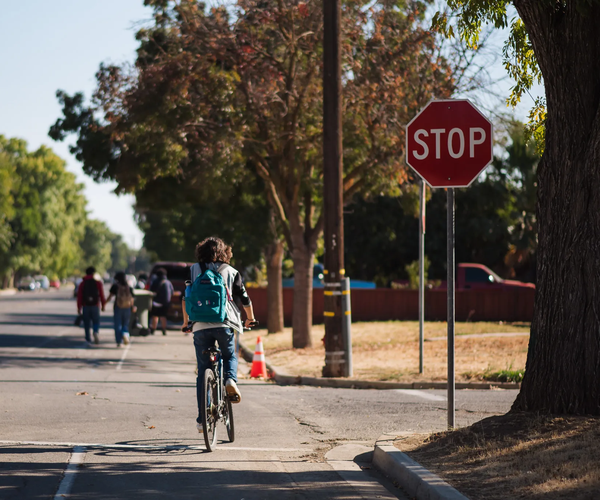Rep. Adam Gray, who represents California’s 13th Congressional District—including Gustine, Newman, and much of the surrounding Westside—recently sat down for a candid conversation about the state of national politics, agriculture, and the challenges facing rural communities. Over coffee and conversation at a Turlock café, Gray reflected on his transition from Sacramento to Washington, the dysfunction he’s witnessed in Congress, and his ongoing efforts to protect Valley growers from the economic fallout of federal tariffs.
From bipartisan baseball games to bipartisan bills, Gray emphasized the importance of cooperation across party lines—especially when it comes to issues that hit close to home for Westside residents, like food prices, farming contracts, and economic stability. His message to constituents: “Progress is the hard work of sitting down with somebody you don’t agree with and figuring out what you can agree on to move forward.
Joe Cortez: I’m going to start you out with a softball question. Actually, it’s a baseball question: How did you do in the Congressional baseball game?
Adam Gray: We had a great time. But I’ve got to tell you, the practices were almost more fun than the game. It’s a fun way to meet other members of Congress. I mean, it’s a big body. I met Rep. Morgan Garvey from Louisville, Ky., and he actually got us all Louisville Slugger bats with our names on them. The Republicans won, unfortunately, so we’ve got to practice harder next year. And I’ll tell you, the other part that was probably the most fun was practicing with the local community college team. It was just a great experience.
JC: So, how is DC different from Sacramento, where you served 10 years as an Assemblymember?
AG: I mean, the politics are the same, right? The dynamics of politics — on the right and on the left and in the middle — is trying to sort that all out and bring people together. And these are things I’ve been working on my whole career. But they do a lot less bills in Washington, and the bills have a lot more in them, whereas in Sacramento, there's something called the Single Subject Rule, which means every bill has to be fairly narrowly focused on one thing.
And one of the things that's broken in Washington is they don’t use their regular process, because even within the Republican Party they can’t agree with themselves, so they can’t get things out of the Rules Committee and onto the floor in regular bills.
I think that's unfortunate. I’ve spent my entire career saying that Republicans and Democrats working together is a good thing. And I would back that argument up by saying, if you look at the most durable, long-standing policies of the United States that have happened over decades, they’re things that were accomplished in a bipartisan manner. Whenever you have strictly party-line votes, what happens is, eventually, the other party elects a president and a congress and they undo everything. That's not progress. Progress is the hard work of sitting down with somebody you don’t agree with and figuring out what you can agree on to move forward. We do it in business every day, our kids do it at school every day, and we do it in our homes every day. So, Washington has a lot to learn. Washington is a bit of a shit show, to use a technical term.
JC: We’ve heard a lot about redistricting in Texas, and then Gov. Newsom announced he’d counter with redistricting in California. What are your thoughts about using redistricting as a political weapon?
AG: Well, we have redistricting every 10 years. We take a census, and there's a process. Districts have been drawn, and I think it’s in everybody's interest that we continue down that path. Having said that, I also think everybody ought to play by the same rules. If Texas wants to do something, then I think California or any other state has every right to do the same. Now, can somebody give me a good argument as to why Texas is doing this? I think the only answer is Texas can't win under the current rules and is trying to change those rules. What would we say to our own kids if, in the middle of a Wiffle Ball game, they wanted to change the rules? No! The rules are the rules and we’re going to play them.
JC: Let’s talk about tariffs. Reports indicate that tariffs will not be good for our local ag economy. Do you agree with that assessment?
AG: I’ve introduced and signed on to, I think, every single bill that I can in Congress opposing the president's efforts on tariffs. Sen. Rand Paul (R-Kentucky) is carrying a bill that I'm supporting over in the Senate, along with a bipartisan bill with Sen. (Chuck) Grassley (R-Iowa) and Sen. (Maria) Cantwell (D-Washington). We have a house version, too. And I have a bill that I introduced specific to agricultural products — the Stop Raising Prices on Food Act. And the goal there is to say that food is special — it’s one of the big line items in everybody's budget every month. It's also kind of a national security issue. I mean, we saw during COVID what can happen when supply chains are disrupted. Imagine if we outsourced all of our food production, and what that would mean in a crisis moment like COVID? So, I introduced a bill specific to agricultural products that we import and export. JC: What’s the status of your bill?
AG: It’s introduced. The Republicans have refused to schedule a hearing or move the bill. I've signed on to half a dozen bipartisan bills. Each one's different, but all of them essentially create a process for Congress to approve or disapprove of these tariffs that the president's enacting. And I don't think it's saying anything controversial to point out that, as a result of the president's tariffs, we've had the stock market bouncing up and down constantly. We've had growers here in the Valley who don't know how to make crop decisions going into next year. We have growers who have lost major contracts with other countries. I mean, I'm familiar with one grower here in the Valley who lost a massive contract with a Canadian company — a grocery deal they may never get back — because of consumer sentiment in Canada. You know, the stock market goes back up after it goes down, but you don’t get back a sales contract that you’ve lost.
JC: President Trump is expected to nominate a new head for the Bureau of Labor Statistics this week, just days after firing Erika McEntarfer following the release of a jobs report that wasn’t to the president’s liking. How do you view this move?
AG: I think it’s incredibly dangerous that we continue down this path. We’ve got to stop politicizing non-political things. Facts and information are not political. And where they became political is when the president said, “Well, that fact makes me look bad, therefore we're going to get rid of the person who came up with the data.” It has no place in our government; it has no place in a democracy. But you see it in authoritarian regimes time and time again.
JC: Do you think President Trump has authoritarian designs?
AG: Whether or not Trump means to be an authoritarian, his ideas are creating dangerous parts of our government that have no place here. And guess what. In a free democracy where we have free speech, I can say that. And I'll keep saying it. When he has bad ideas, I'm going to say they're bad ideas. Is it a good idea to fire people who create facts and data about the economy without political influence? No, it’s not. It reeks of being a poor loser: the rules aren't working for me, so I'm going to change them, because I want to look like I win at everything. Give me a break. Grow up.
JC: Remaining on the topic of President Trump, it’s been alleged that his name appears in the infamous Epstein files. You and the rest of your congressional colleagues were sent home before a vote could be taken on whether to release the information in those files. How did that maneuver sit with you?
AG: Well, I think it's absurd. Again, it’s a little like changing the rules in the middle of the game.
What went on with these young women is a serious matter. Having said that, it’s become a bit of a circus that these Republicans are running in Congress. The only people that ever started a conspiracy theory around the Epstein files were the Republicans, and they claimed that every Democrat was in those files. Now, we find ourselves in August with everyone being sent home early because they’re worried that one of them is in there. I mean, it’s like watching a reality TV show. I believe government is a serious thing and deserves serious people, not reality TV stars trying to cook up conspiracy theories. Frankly, any Republican who’s in there should be held accountable. And any Democrat who’s in there should be held accountable.
One of the worst things about politics in the last 20 years is that instead of questioning each other’s ideas, we've begun to just question each other’s character. I represent a lot of Democrats, and a lot of Republicans, and a lot of independents, and a lot of people who choose not to pick a political party. They're almost all good people. Are there some bad apples? Sure, there are in any community. But are most people in our communities good people trying to do the right thing? Of course, they are. And maybe we should see that in our politics, instead of always saying that the other doesn’t have character and is immoral. No, they just have different ideas. And we should debate our best ideas; the ideas that work best should be the ones that we implement together.
JC: Let’s turn to the subject of immigration. I don't know if the videos I see on social media are altered or if we’re getting the entire context, but it’s alarming to see people being yanked out of cars and grocery stores and courtrooms, only to be whisked away to who knows where. Do these practices concern you?
AG: It is disturbing in the deepest way, and it does make you think about the Founding Fathers. Why did they come to this country? Why did we create the United States of America and a constitution and a Bill of Rights?
I'm a strong supporter of law enforcement and always have been. I’ve met my Republican colleagues in compromise on most of those issues throughout the years. But I don't believe in a government that can turn on its own people. Period. Full stop. You don't want to empower the government in a way where it's using its force and its money against its own people. And we're seeing some of that. We depend on these folks, and because of these threats and these scary videos, people are not going to work, people are not going to their doctor's appointments, children are not going to school in some instances, people are feeling too scared to go to the grocery store. That's absurd, and that doesn't benefit anybody.
I've introduced the Farmworker Modernization Act and there's no reason we couldn't act on it tomorrow. There are Republicans and Democrats supporting the bill. It’s a middle-of-the-road bill that would provide some legal protections for people who are here following the law, working hard to support not just our ag economy, but many of our small businesses throughout the Valley. On top of that, I've introduced the Dignity Act, which is also a bipartisan piece of legislation that provides increased border security, as well as legal protections for people who are here, following the law. It doesn't provide a pathway to citizenship; the Republicans weren't willing to go that far, but it provides legal protections for people here following the law and contributing to our society. So there are two bills, both bipartisan, that we could send to the president's desk tomorrow, but we can't even get a hearing scheduled because the Republicans don't want to do anything that's not just strictly partisan, and I think that's a real disservice to this community here in California, and I think it's a disservice to the country.
You know, all I hear about from my Republican colleagues is the criminal immigrants. Well, we've done a bunch of bills to deal with the criminal immigrants. Now, what are we doing for the law-abiding immigrants? What are we doing for people that are our neighbors and our friends, whose children go to school with our children, who work here, and are doing nothing but contributing positively. We’ve got two bills, and we could do them. Instead, we're going home, because the Republicans can't figure out which one of them is in the Epstein files.
JC: Finally, Congressman, how would you characterize your first seven months in Congress?
AG: Well, it’s been extraordinarily disorganized. We’ve had many late-night votes because Republicans can’t get their votes together, and get their members to agree. There hasn’t been enough bipartisanship. I’m a Blue Dog Democrat, and I am a big believer in a balanced budget. I don’t disagree with Republicans who want to reign in spending where there is waste, fraud, abuse, and opportunities to be more efficient, then taking those savings and applying them to our national debt, which is $37 trillion now. I’d like to see us get back to really putting our fiscal house in order. The Republicans, instead, decimated food programs for children and the elderly — massive cuts. They’ve slashed our health care, and we’re going to see premiums rise and services cut here in the Valley with this current plan. That’s not making America great again. It’s ridiculous.
But for people who want to sit down and actually work on our real problems together, they’ll find in this conservative Democrat a great partner.





